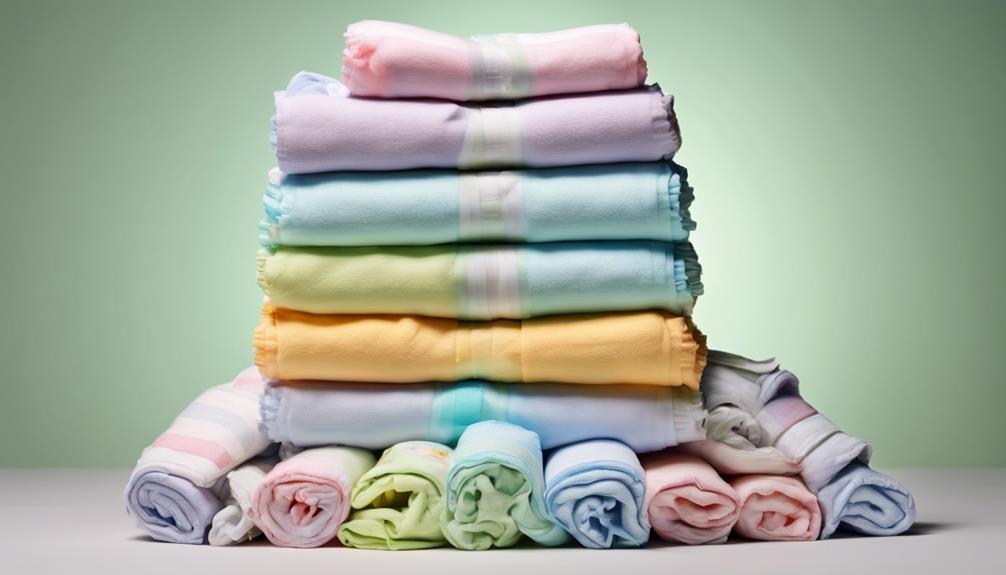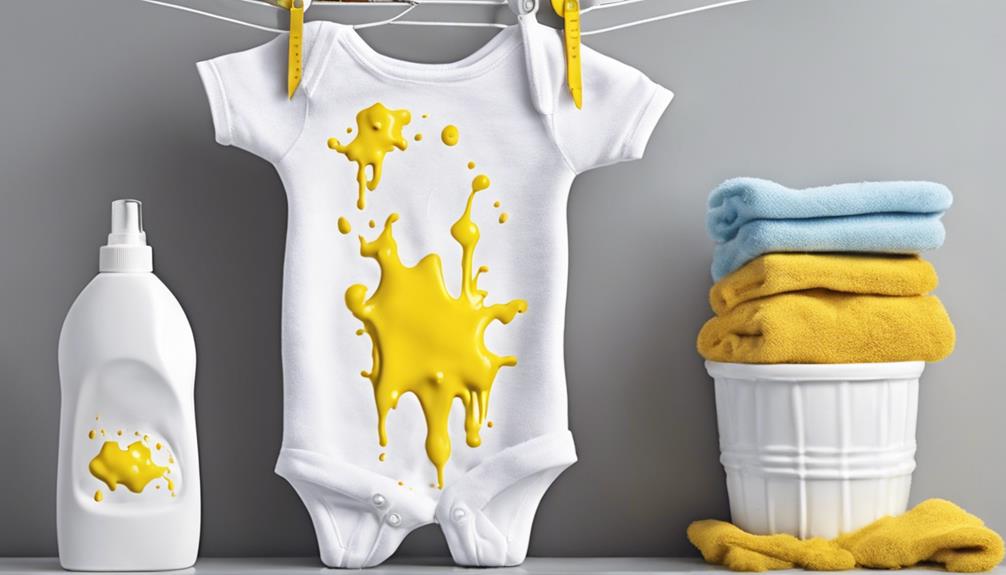When caring for **uncircumcised babies**, it is important to approach the task with care and consideration. **Keep their genital area clean** and handle it gently to ensure their health and comfort. Parents or caregivers of infants will benefit most from following these guidelines to promote the baby’s well-being. Keep in mind the importance of proper hygiene in this aspect of baby care.
However, there are essential nuances and guidelines to observe in this process that can greatly impact your baby's well-being. Let's explore the intricacies of this topic and how best to navigate the care of your uncircumcised baby to promote their best health and development.
Key Takeaways
- Avoid forcing foreskin back; let it separate naturally.
- Use warm water and mild soap for gentle cleaning.
- Monitor for signs of infection like redness or swelling.
- Seek medical advice for any discomfort or unusual symptoms.
Hygiene Tips for Newborn Care
When caring for your uncircumcised newborn, it's important to prioritize gentle hygiene practices to guarantee their comfort and well-being. The foreskin on a newborn's penis is delicate and should never be forced back to prevent pain, tearing, or bleeding.
To make certain proper care, gently wash the area with warm water and mild soap during diaper changes. Avoid harsh chemicals or strong fragrances that could irritate their sensitive skin. Remember, the foreskin should never be retracted forcefully, as it will naturally separate over time.
If you notice any signs of discomfort or infection, it's essential to consult a healthcare provider promptly. As your child grows, teach them how to clean beneath the foreskin gently. By following these hygiene tips from the start, you're setting the foundation for good penile health in the future.
Bathing Your Uncircumcised Baby
To guarantee the cleanliness and comfort of your uncircumcised baby, it's recommended to bathe them every few days following gentle hygiene practices. Here are some essential tips to keep in mind:
- Follow Guidelines: Adhere to the American Academy of Pediatrics recommendations on bathing frequency to assure proper hygiene for your baby.
- Use Gentle Products: Avoid harsh soaps or chemicals when cleaning your baby's genital area to prevent irritation.
- Be Gentle: Clean only the visible parts of the penis without retracting the foreskin to prevent any discomfort or injury.
- Thorough Drying: After cleaning, make sure the genital area is thoroughly dried to prevent infections and promote overall hygiene.
Preventing Infections in Baby Boys
To safeguard your baby boy's health and well-being, it's important to prioritize preventive measures against infections in the genital area. When caring for your uncircumcised newborn, remember to avoid forcibly retracting the foreskin. Doing so can cause pain, bleeding, and tears in newborn boys.
During diaper changes, practice good hygiene by gently wiping the visible parts of the penis. It's vital to understand that the foreskin will naturally separate over time, typically by 3-5 years of age. If you have concerns about cleaning under the foreskin, consult your pediatrician for guidance.
Monitor the genital area for any signs of redness, swelling, or discharge, as these could indicate infections. Seeking medical help promptly if you notice any unusual symptoms is important to guarantee your baby's health and comfort. By following these tips and seeking pediatrician advice when needed, you can help prevent infections and promote your baby boy's well-being.
Understanding Foreskin Development
Understanding the natural progression of foreskin separation is essential for parents of uncircumcised newborns. Here are some key points to ponder regarding foreskin development:
- Natural Separation: Foreskin naturally separates from the glans over time, a process that can occur within months to years.
- Pediatrician Monitoring: Pediatricians play an important role in monitoring the progress of foreskin separation in infants to guarantee healthy development.
- Potential Conditions: Conditions like phimosis (tight foreskin) and balanitis (inflammation of the glans) can impact foreskin development and may require medical attention.
- Importance of Hygiene: Proper hygiene practices, such as gently cleaning the area with warm water, can help prevent issues related to foreskin development and maintain overall penile health.
Common Concerns and Solutions
When encountering concerns about your uncircumcised newborn's foreskin, it's essential to approach them with care and seek appropriate solutions promptly. One common concern is foreskin separation, which typically occurs between 3-5 years of age, allowing for natural cleaning. It's important to avoid forcing the foreskin back to prevent pain, tearing, and bleeding. If there are signs of discomfort or infection, consulting a healthcare provider is essential. To promote proper hygiene, teach your child to gently clean beneath the foreskin as they grow. Regularly rinsing the area under the foreskin with warm, soapy water can help maintain cleanliness. Below is a table summarizing key points for addressing concerns about your uncircumcised newborn's foreskin:
| Concern | Solution |
|---|---|
| Foreskin separation | Allow natural cleaning over time |
| Discomfort | Consult healthcare provider |
| Infection | Seek medical attention promptly |
| Gentle cleaning | Teach child proper hygiene habits |
| Regular rinsing | Use warm soapy water for cleaning |
Frequently Asked Questions
Can an Uncircumcised Newborn Baby Still Be Bathed in the Same Way as a Circumcised Baby?
Yes, an uncircumcised newborn can be bathed the same way as a circumcised baby. Gently cleanse the genitals with warm water, avoiding harsh soaps. Remember to always pat the area dry and avoid pulling back the foreskin.
How Often Should I Clean Under My Baby's Foreskin and What Is the Best Way to Do So?
When caring for an uncircumcised newborn, it's important to clean under the foreskin gently. We recommend doing this as part of your regular bathing routine. Use warm water and mild soap, making sure to rinse well.
Are There Any Specific Signs or Symptoms I Should Watch Out for to Prevent Infections in My Uncircumcised Baby Boy?
We should watch for signs like redness, swelling, discharge, or foul odor under the foreskin. Keeping an eye out for these symptoms can help prevent infections in our uncircumcised baby boy. Regular gentle cleaning is also important.
Will My Baby's Foreskin Naturally Retract on Its Own as He Grows Older, or Is There a Certain Age When I Should Start Worrying if It Hasn't?
As parents, we comprehend the concern about foreskin retraction. Rest assured, it's normal for this process to vary among children. Most boys' foreskins naturally retract by puberty, but if not, consult a healthcare provider for guidance.
Are There Any Special Considerations or Precautions I Should Take When Caring for an Uncircumcised Baby in Terms of Diaper Changes or Clothing Choices?
When caring for an uncircumcised baby, it's important to remember to gently clean the area during diaper changes. Make sure to avoid harsh soaps and excessive rubbing. Opt for loose-fitting clothing to prevent irritation.
Conclusion
To guarantee care of your uncircumcised newborn's penis requires gentle handling and proper hygiene practices. Remember to never force back the foreskin, as it can cause pain and injury.
By using nonirritating soap and water during baths and teaching your child to clean beneath the foreskin once advised, you can make sure their penile health.
Rest assured, with patience and care, you'll be a pro at keeping your little one's penis in tip-top shape!










